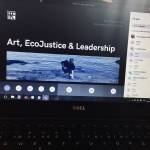Based on Raisa Foster’s online lecture ‘Art, EcoJustice, and Leadership’ on 20.03.2020
 We are living in an era of eco-social crisis, says Dr. Raisa Foster, a multidisciplinary artist and scholar based in Finland. In light of the COVID-19 pandemic and other ongoing background crises, she claims that “everything we have taken for granted has suddenly collapsed”.
We are living in an era of eco-social crisis, says Dr. Raisa Foster, a multidisciplinary artist and scholar based in Finland. In light of the COVID-19 pandemic and other ongoing background crises, she claims that “everything we have taken for granted has suddenly collapsed”.
In her online lecture entitled ‘Art, EcoJustice and Leadership’ on March 20th, Foster discusses modern art and its potential value for social and ecological justice and well-being. She challenges the audience to investigate and expose structures within our current policies, practices and relationships we have, not just with other humans, but with animals and the wider world. How do we make sense of what is happening in the world? Moreover, how can we review critical assumptions of everyday life and move towards change?
To answer these questions and to assist the search for new paths forward, she offers three frameworks: criticality, commons, and creativity.
Criticality, commons, and creativity
Criticality is crucial to revealing the assumptions behind modern life, according to Foster. Dualistic thought runs through the industrial world and Western culture, defining our relationships with each other and with nature. This dualism—for example the division between reason and emotion—leads to the subsequent primacy of rational humanism and the assumption that rationality is the only access to truth. Art in particular, Foster says, can challenge this concept of truth. Artists’ explorations initiate multiple sensibilities; not just rational, but also sensory, emotional, ethical, and aesthetic. Therefore, art can serve as a powerful way to challenge the harmful effects of rationalism and the value hierarchies that are associated with it.
Next, Foster argues for identifying patterns of belief and behaviour that lead to mutual care and the protection of more sustainable ways of life. In general, the concept of the ‘commons’ comes from ancient practices in land-based communities in which areas were shared. Nowadays the commons represent both our necessary relationship with the wider living world and ecosystems, and the beliefs, practices and traditions that help to maintain healthy mutuality between people and the modern human world.
Creativity argues for having the imagination to investigate the world and to imagine living ethically in this world and what that might look like. Artistic practices can help us move away from the destructive effects of capitalism and lead us towards sustainable and democratic communities.
Towards these goals, the artist can be seen as the facilitator who creates dialogue for imagination. “We think of art as a painting hanging on the wall, but contemporary art has moved on. Performances, which are ephemeral, emphasise the existence of the moment and invite us to experience the present. The situation that we are coming to notice is that more scientific knowledge doesn’t really change our behaviour, but art can touch our hearts… and that’s where it can really lead us to action for change”, she argues.
Leadership into the unknown
Foster also advocates that small gestures can radically shift our assumptions and behaviour. In terms of leadership, collaboration and work life, nothing feels as good as being accepted and respected in your field. Sustainable, holistic well-being can be created and attained through recognition at individual and communal levels, citing her doctoral research.
Summarising, Foster links the themes of art, eco-justice and leadership and recognition-based leadership. We never know what the future is going to be and we are always heading into the unknown. As leaders, however, we still need some vision or hope for the future, while creating the future as we live it. We cannot separate the ethical aspects from our actions. We must also question the current value hierarchies and remember that we are very different, but all valuable.
Discussion
The presentation generated great interest with the audience, with viewers using the opportunity to interact with Foster to seek further details, elicit clarifications and press for views and perspectives on broader issues. Asked about the role of artists as facilitators, Foster stresses that this is about creating spaces for dialogue, so that art can reveal and challenge structures and narratives. Another comment raised the issue of the commodification of contemporary art, to which Foster agreed and stressed that not all art within this classification revitalises commons. Further questions focused on issues including dualism, difference and diversity, the revitalisation of commons, bringing sensory dimensions in the face of ubiquitous technological devices, and the value of humans and animals and the range of values, near and far, found in societies and cultures. Foster also provided examples of art and performance that had initiated profound change.
Raisa Foster says her current work focuses on theoretical issues, including research into the concept of eco-socialisation and the sensory aspects of drawing.
We thank Raisa for her participation and presentation in this three-part lecture series produced as part of the Leadership for Change Master’s programme.
The lecture was organised by Raysa Franca Pereira Do Carmo, Karoliina Heikkilä, Meredith Chuzel-Marmot, Juuso Ilmola, Andrew Jones, Valentyn Nizyev, Sarah Miselly, Loriin Sheble, and Marc Wolsztynski.


Comments